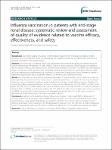Influenza vaccination in patients with end-stage renal disease: systematic review and assessment of quality of evidence related to vaccine efficacy, effectiveness, and safety
Remschmidt, Cornelius
Wichmann, Ole
Harder, Thomas
Background: Vaccination against influenza is recommended in patients with end-stage renal disease (ESRD). However, so far, no systematic review has summarized the available evidence on the effectiveness and safety of influenza vaccination in this patient group. Methods: We conducted a systematic review and meta-analysis and assessed the quality of evidence using the GRADE methodology. We searched MEDLINE, EMBASE, Cochrane Library databases, ClinicalTrials.gov, and reference lists for studies on efficacy, effectiveness, and/or safety of seasonal influenza vaccination in patients with ESRD receiving dialysis. All reported clinical outcomes were considered, including all-cause mortality, cardiac death, infectious death, all-cause hospitalization, hospitalization due to influenza or pneumonia, hospitalization due to bacteremia, viremia, or septicemia, hospitalization due to respiratory infection, ICU admission, and influenza-like illness. Results: Five observational studies and no randomized-controlled trial were identified. In four studies, risk of bias was high regarding all reported outcomes. Strong residual confounding was likely to be present in one study reporting on three outcomes, as indicated by significant protective effects of vaccination outside influenza seasons. Therefore, the statistically significant protective effects on all-cause mortality (vaccine effectiveness (VE), 32%; 95% CI, 24–39%), cardiac death (VE, 16%; 95% CI, 1–29%), hospitalization due to influenza or pneumonia (VE, 14%; 95% CI, 7–20%), ICU admission (VE, 81%; 95% CI, 63–86%), and influenza-like illness (VE, 12%; 95% CI, 10–14%) have to be taken with caution. According to GRADE, the quality of the body of evidence was considered very low for all outcomes. No study reported on laboratory-confirmed influenza virus infections or on safety endpoints. Conclusions: Evidence on the protective effects of influenza vaccination in patients with ESRD is limited and of very low quality. Since VE estimates in the available literature are prone to unmeasured confounding, studies using randomization or quasi-experimental designs are needed to determine the extent by which vaccination prevents influenza and related clinical outcomes in this at-risk population. However, given the high rates of health-endangering events in these patients, even a low VE can be considered as sufficient to recommend annual influenza vaccination.
Dateien zu dieser Publikation
Keine Lizenzangabe

